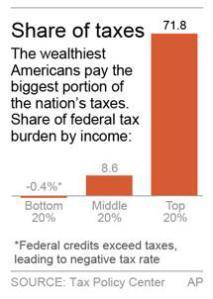
Tax bills for rich families approach 30-year high
Boston.com: With Washington gridlocked again over whether to raise their taxes, it turns out wealthy families already are paying some of their biggest federal tax bills in decades even as the rest of the population continues to pay at historically low rates.
President Barack Obama and Democratic leaders in Congress say the wealthy must pay their fair share if the federal government is ever going to fix its finances and reduce the budget deficit to a manageable level.
A new analysis, however, shows that average tax bills for high-income families rarely have been higher since the Congressional Budget Office began tracking the data in 1979. Middle- and low-income families aren’t paying as much as they used to.
For 2013, families with incomes in the top 20 percent of the nation will pay an average of 27.2 percent of their income in federal taxes, according to projections by the Tax Policy Center, a research organization based in Washington. The top 1 percent of households, those with incomes averaging $1.4 million, will pay an average of 35.5 percent.
Those tax rates, which include income, payroll, corporate and estate taxes, are among the highest since 1979.
The average family in the bottom 20 percent of households won’t pay any federal taxes. Instead, many families in this group will get payments from the federal government by claiming more in credits than they owe in taxes, including payroll taxes. That will give them a negative tax rate.
‘‘My sense is that high-income people feel abused by being targeted always for more taxes,’’ Roberton Williams, a fellow at the Tax Policy Center, said. ‘‘You can understand why they feel that way.’’
Last week, Senate Democrats were unable to advance their proposal to raise taxes on some wealthy families for the second time this year as part of a package to avoid automatic spending cuts. The bill failed Thursday when Republicans blocked it. A competing Republican bill that included no tax increases also failed, and the automatic spending cuts began taking effect Friday.
The issue, however, isn’t going away. Obama and Democratic leaders in Congress insist that any future deal to reduce government borrowing must include a mix of spending cuts and more tax revenue.
‘‘I am prepared to do hard things and to push my Democratic friends to do hard things,’’ Obama said Friday. ‘‘But what I can’t do is ask middle-class families, ask seniors, ask students to bear the entire burden of deficit reduction when we know we’ve got a bunch of tax loopholes that are benefiting the well-off and the well-connected, aren’t contributing to growth, aren’t contributing to our economy. It’s not fair. It’s not right.’’
On average, households making more than $1 million this year will pay 37.2 percent of their income in federal taxes, according to the Tax Policy Center. But there are exceptions.
For example, the Internal Revenue Service tracks tax returns for the 400 highest-paid filers each year. Those taxpayers made an average of $202 million in 2009, the latest year available. Their average federal income tax rate: 19.9 percent.
That’s still higher than the tax rate paid by most middle-income families, but not by much. The middle 20 percent of U.S. households — those making an average of $46,600 — will pay an average of 13.8 percent of their income in federal taxes for this year, according to the Tax Policy Center. Over the past three decades, the average federal tax rate for this group has been about 16 percent.
Read the rest here.
Elections have consequences.
DCG

